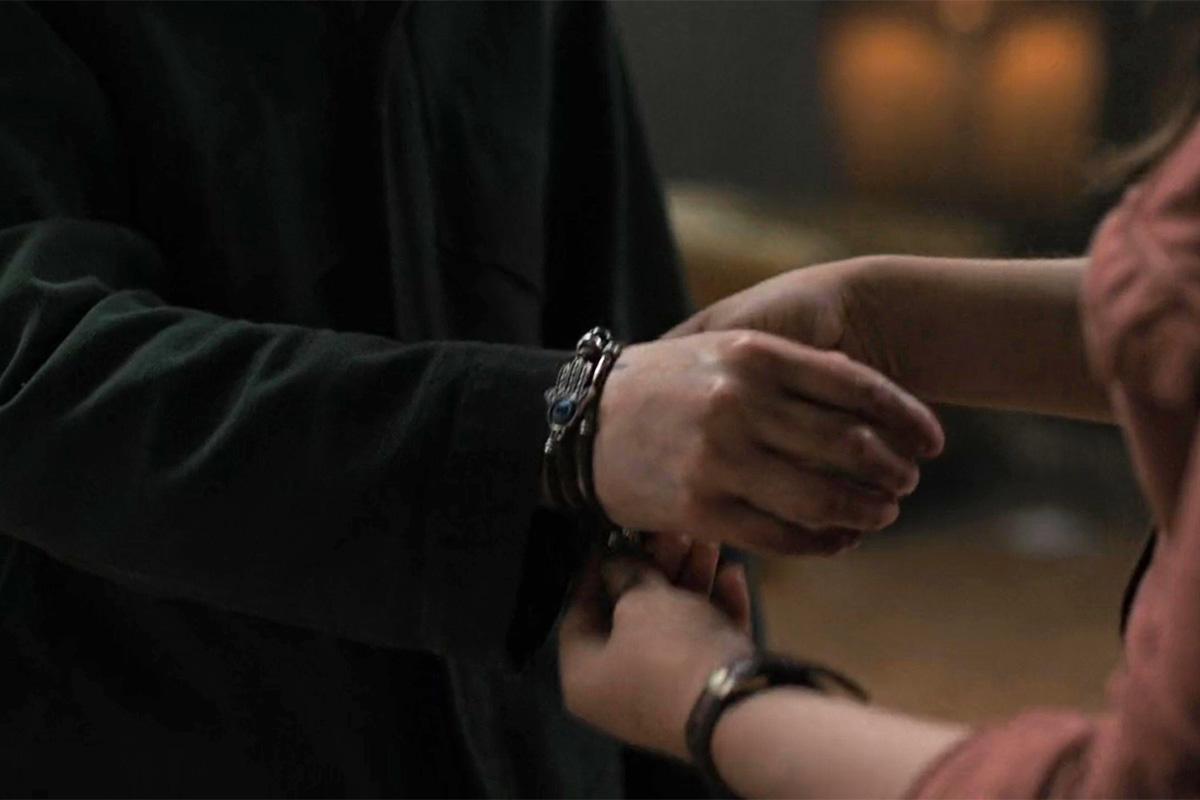Editorial note: Light spoilers ahead for HBO Max’s “The Last of Us.”
In “The Last of Us Part II,” the sequel to post-apocalyptic video game “The Last of Us,” gamers find themselves in an unusual setting for a video game: a synagogue. It’s early in the game and protagonist Ellie and her girlfriend Dina are looking for gasoline when they come across the abandoned shul. It’s here that Dina reveals her Sephardic Jewish identity. She shares with Ellie how her family survived the Spanish Inquisition and the Holocaust, teaches her about the Torah and longs for the apples and honey her sister gave her during Rosh Hashanahs past.
“Though they are living in an apocalyptic world overrun by zombies, Dina’s Jewishness feels so real,” Mimi Halpern wrote for Hey Alma in 2021. “The apples and honey line in particular made me realize I had never seen a Jewish character in a video game that I could relate to before now. While Dina says she wouldn’t describe herself as a believer, she explains that her faith is a source of comfort and a way to deal with grief. Unlike many past depictions of Jewish people in games, Dina is not reduced to her religion. Rather, Dina’s Jewishness is a piece of her background that aids in understanding her perspective as the story progresses.”
But what about the hit HBO adaption of the video game starring Bella Ramsey as Ellie and Pedro Pascal as Joel? Is Dina’s Jewishness just as present and important there too?
The short answer: Not quite.
In January 2024, HBO’s announcement that actress Isabela Merced would play Dina was met with some pushback. Isabela Merced is not Jewish, and some “The Last of Us” fans worried that she wouldn’t be able to portray Dina authentically or that Dina’s Jewishness would be erased entirely. For the majority of the new season, the latter fear seemed to be coming true. Not only was the synagogue scene from the video game omitted from the show, but Dina’s backstory was slightly re-written. Instead of Dina getting to spend some of her early life with her older sister Talia and celebrate Rosh Hashanah together, in the show, their mom and Talia are killed by a raider when Dina is 8. In effect, this takes away any connection to Jewish tradition that Dina had in the game.
For what it’s worth, before the season began airing, Isabela Merced said that the synagogue sequence in the game was inspiring to her. “It’s devastating and it’s also inspiring, like, ‘My people survived, so I can survive this.’ It’s really beautiful,” Isabela told EW. “I really appreciated that sequence in the game because it revealed so much and it made her multi-dimensional and layered and vulnerable.”
Still, the show’s seeming erasure of Dina’s Jewish identity was upsetting to Jewish fans. “Slowly watching her Jewish identity being erased and no one caring because apparently it ‘doesn’t matter’ and it’s ‘not important’ Jewish Dina you’re so precious to me,” one X user wrote earlier this month in a tweet which garnered nearly 5,000 likes.
However, the season two finale of “The Last of Us” did provide a conscious hint at Dina’s religious background. Now in Seattle, Ellie and ally Jesse (Young Manzino) are getting ready to leave their hideout in a theater to rendezvous with Joel’s brother Tommy (Gabriel Luna). An injured Dina is staying put, so she does the only thing she can do to protect her girlfriend. She gives Ellie her bracelet. “Give me your wrist,” Dina says to Ellie. “The other one,” she instructs, after Ellie first offers her left arm. Dina then proceeds to tie the bracelet around Ellie’s wrist, and as she does so, a giant hamsa charm with a blue evil eye in the center becomes extremely prominent.
“It’s for good luck,” Dina explains.

So does this mean that Dina is Jewish in the show? I think, tentatively, the bracelet suggests she is. Despite the fact that the hamsa and evil eye have meaning in Islam and Christianity, they are also important symbols in Sephardic Jewish culture and Jewish mysticism. “Jews might have used the hamsa to invoke the hand of God, or to counteract the Evil Eye with the eye embedded in the palm of the hand,” My Jewish Learning explains. “Other icons besides eyes and fish have also found their way into the hamsa, including the Star of David, prayers for the traveler, the Shema, the blessing over the house, and the colors of red and blue, both of which are said to thwart the Evil Eye.”
With the context that Dina is Jewish in the video game, the inclusion of the hamsa bracelet in the show seems to be an intentional nod to Dina’s Jewishness. Whether it’s enough of one to satisfy Jewish fans of “The Last of Us” game and show, however, is likely an entirely different story.



